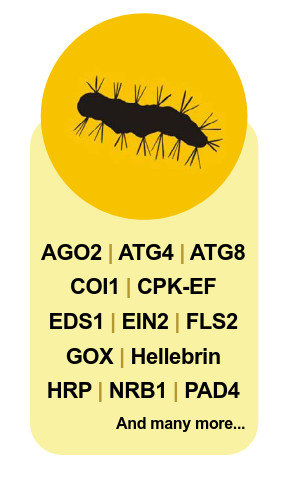As plants cannot move and change their habitat quickly as animals can, they have instead developed other amazing strategies to cope with various pathogen attacks. Listed below are some examples of plant pathogens. |  |
Latest
Interactive workshop focused on antibodies and Western blot held at the University of Wrocław, Poland2025-12-12 Interview with Prof. Debabrata Laha
2025-12-10 Agrisera Prize at Umeå Plant Science Centre 2025
2025-12-05 Interview with Assistant Prof. Ivan Radin
2025-11-27 Agrisera last shipment date in 2025
2025-11-24 Agrisera supports Canadian Society of Plant Biologists Western Regional Meeting
2025-11-21 Agrisera workshop for researchers in China, with Agrisera distributor XMJ
2025-11-21 Western blot workshop with Agrisera exclusive distributor in UK, 2BScientific
2025-11-14 Agrisera at KBC Days 2025
2025-11-12 Interview with Prof. Łucja Kowalewska
2025-11-11
Archive
- December - 2025
- November - 2025
- October - 2025
- September - 2025
- August - 2025
- July - 2025
- June - 2025
- May - 2025
- April - 2025
- March - 2025
- February - 2025
- January - 2025
- December - 2024
- November - 2024
- October - 2024
- September - 2024
- August - 2024
- July - 2024
- June - 2024
- May - 2024
- April - 2024
- March - 2024
- February - 2024
- January - 2024
- December - 2023
- November - 2023
- October - 2023
- September - 2023
- August - 2023
- July - 2023
- June - 2023
- May - 2023
- April - 2023
- March - 2023
- February - 2023
- January - 2023
- December - 2022
- November - 2022
- October - 2022
- September - 2022
- August - 2022
- July - 2022
- June - 2022
- May - 2022
- April - 2022
- March - 2022
- February - 2022
- January - 2022
- December - 2021
- November - 2021
- October - 2021
- September - 2021
- August - 2021
- July - 2021
- June - 2021
- May - 2021
- April - 2021
- March - 2021
- February - 2021
- January - 2021
- December - 2020
- November - 2020
- October - 2020
- September - 2020
- August - 2020
- July - 2020
- June - 2020
- May - 2020
- April - 2020
- March - 2020
- February - 2020
- January - 2020
- December - 2019
- November - 2019
- October - 2019
- September - 2019
- August - 2019
- July - 2019
- June - 2019
- May - 2019
- April - 2019
- March - 2019
- February - 2019
- January - 2019
- December - 2018
- November - 2018
- October - 2018
- September - 2018
- August - 2018
- July - 2018
- June - 2018
- May - 2018
- April - 2018
- March - 2018
- February - 2018
- January - 2018
- December - 2017
- November - 2017
- October - 2017
- September - 2017
- August - 2017
- July - 2017
- June - 2017
- April - 2017
- March - 2017
- February - 2017
- December - 2016
- November - 2016
- October - 2016
- September - 2016
- August - 2016
- July - 2016
- June - 2016
- May - 2016
- April - 2016
- March - 2016
- February - 2016
- January - 2016
- December - 2015
- November - 2015
- October - 2015
- September - 2015
- August - 2015
- July - 2015
- June - 2015
- May - 2015
- March - 2015
- February - 2015
- January - 2015
- December - 2014
- November - 2014
- October - 2014
- September - 2014
- August - 2014
- July - 2014
- June - 2014
- May - 2014
- April - 2014
- March - 2014
- February - 2014
- January - 2014
- December - 2013
- November - 2013
- September - 2013
- August - 2013
- July - 2013
- June - 2013
- May - 2013
- April - 2013
- February - 2013
- January - 2013
- December - 2012
- October - 2012
- September - 2012
- August - 2012
- July - 2012
- June - 2012
- May - 2012
- April - 2012
- March - 2012
- December - 2011
- November - 2011
- September - 2011
- August - 2011
- July - 2011
- April - 2011
- January - 2011
- December - 2010
- October - 2010
- September - 2010
- August - 2010
- July - 2010
- March - 2010
- January - 2010
- December - 2009
- November - 2009
- September - 2009
- July - 2009
- June - 2009
- May - 2009
- March - 2009
- January - 2009
- December - 2008
